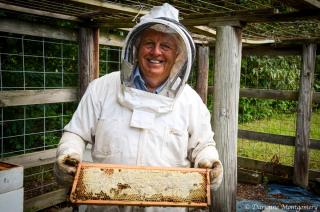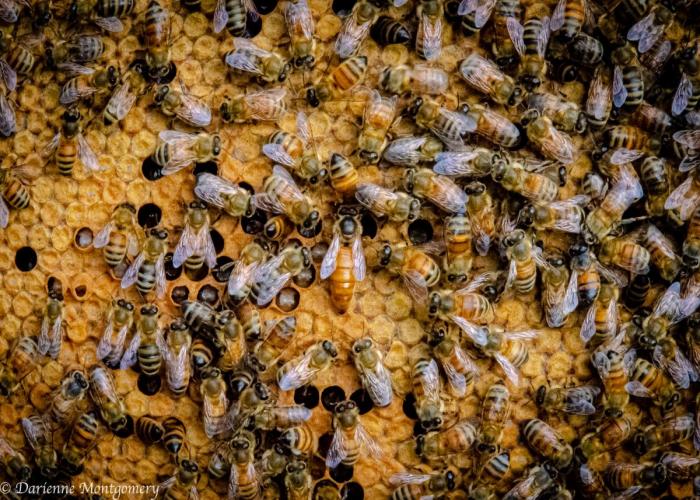Local Beekeeper

Down on Red House Road where the land is covered in wildflowers and tall, hardwood trees lives a pastor that has found joy in beekeeping. Reggie Warren grew up outside of Nashville, Tennessee in Wilson County where he lived with his family on a subsistence farm. His family had a number of hives, and in 2001 when his wife, Lucy Anne, found bee equipment at a discounted price he decided to try his own at the art. Twenty years later, Reggie has nine hives of his own. “Two hives is a hobby, six is a job, and ten is a career. I am trying to keep it from turning into a career,” he jokes. He sells enough honey for the hobby to pay for itself saying he appreciates the work for the symbiotic relationship.
The bees have a home surrounded by nectar-producing vegetation from buckwheat and clover, which he plants himself, to wildflowers and hardwood. In return, he is given the opportunity to work closely with one of nature’s most fascinating creatures and, of course, receives a steady supply of sweet, floral honey during the season. “Besides being a father of four and pastoring a church, it is the most fascinating thing I have ever done.”
Besides producing honey, bees also pollinate the crops that become the food on our tables. “30% of America's food is insect-pollinated. A bee is not the only insect pollinator but they are primarily in terms of food production,” Reggie explained. According to the Piedmont Beekeepers Association, “The population of native bees has been in decline for several decades due to environmental stress and various pests. Hobby beekeepers can be an important factor in rebuilding populations and encouraging species health and diversity.”
Reggie gained most of his beekeeping knowledge from online sources as well as from his mentor. Beginning an endeavor, especially one that involves nature, can be daunting and frustrating at times. “When things are not working the way I think they should,” Reggie says “My mentor reminds me that I can neither predict nor tell an insect what to do.” Having the opportunity to give back to the land, seeing how nature works, and the sweetness of the honey makes it all worthwhile. “It doesn’t take a lot of space or money. Anyone can start a beehive." He encourages anyone that has ever thought of beginning their own hive to give it a try and gladly offers guidance to anyone seeking a mentor.
For more information on bees and beekeeping visit the Piedmont Beekeepers Association
https://www.piedmontbeekeepers.com/
By Darienne Skye Montgomery


